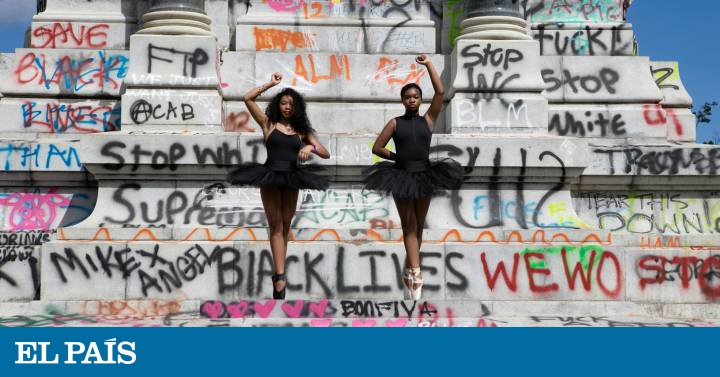The heartbreaking images of the death of George Floyd at the hands of the police on May 25 have triggered the largest social outbreak in the United States since the murder of Martin Luther King in 1968 - so the incidents erupted in more than 125 cities. American.
MORE INFORMATION
The new inequality- The coronavirus crisis is a matter of class
- Manual to replace hate speech
The video brought to the table police brutality and entrenched institutional racism in the public security forces. The black community woke up. However, it is not just police brutality that has set the nation on fire. This has existed other times and the same has not happened. Why?
A comparison of the current conflict with other relevant ones experienced in the country suggests that there is a network of causes, some historical, that are necessary to know. The most relevant social outbreaks have been: New York (1964, 1991), Tampa (1980, 1987), Detroit (1967) and Los Angeles (1965, 1992).
These have as a starting point aspects derived from a situation of injustice in three areas: socioeconomic, ethnocultural and political-institutional. These causal situations generating the conflict have to do with the three Ds (inequality, discrimination, delegitimization); against them, policies and actions oriented to the three Rs (redistribution, recognition, representation) are needed.
Socioeconomic causes
The riots are an example of how the social compact has been broken in American society.
The riots are an example of how the social compact has been broken in American society. Thus, this conflict is no longer simply a racial revolt in the traditional sense of the term (between blacks and whites); but above all a fight between working class African American citizens and white citizen groups against the Police, National Guard and Army.
There are a whole series of structural causes that have to do with the segregation in employment, education and housing of the black community, which has meant relegating a significant part of this population from the economic prosperity of the nation. These riots stem from the deep despair that afflicts people who see no way out of their economic dilemma.
The relevant role that young people are playing in all these conflicts presupposes a kind of social frustration at the impossibility of progress, but also of rejection of authority, together with a reality of family breakdown and consumer culture.
In the events of these days, the very serious health and social crisis caused by the coronavirus pandemic is also present. The black community is being hit harder by the virus than the white population.
Ethnocultural causes
The United States has turned towards two societies, one black and the other white, separate and unequal. Discrimination and segregation are effects that have long been present in the way of life in America, and how they threaten the stability and future of the state. In the revolt, social frustration appears as a factor that leads organized groups claiming black identity to exercise violence. These groups reject white cultural values because of their history of domination.
The media coverage by practically all the press, as well as the overexposure (24 hours) of the events, is making them a powerful claim for people who see joining the protests as a way to channel their frustration and Rage.
Political-institutional causes
The latent conflict between the black community and the police is a substrate on which numerous problems easily occur and goes far beyond being a triggering element. Conflicts, their scope and the violence developed cannot be understood if it is not also assuming the same formula: the intense resentment towards the black community by the police.
In this area, Donald Trump's actions are undoubtedly determining for a further expansion of the conflict, promising a strong hand against protesters, inciting violence in his Twitter messages and pointing out left-wing extremists as terrorist groups responsible for the riots. It is difficult to imagine a worse management of the crisis.
What started as a mobilization against structural racism is mutating into a kind of anti-Trump revolt for its handling of the protests, lack of empathy and stubbornness to mobilize the Armed Forces. His belligerent and divisive approach has been harshly criticized by the Pentagon chief, generals, former presidents, Republican leaders, Democrats and the Catholic Church.
Spontaneous gestures are taking place that have helped ease tension in some protests, and have been repeated across the country, such as hugs between white police and black activists; policemen kneeling in the demonstrations as a tribute to George Floyd; or symbolic gestures, the most recent in Congress.
It is still too early to predict if there will be real changes in society after this anti-racist wave that runs through the United States. For the moment, reforms are announced in the police departments of some cities, with the aim of eradicating police violence.
However, to prevent new violent episodes, it will also be necessary to adopt other types of policies and actions that reverse structural situations of injustice towards the black community from the three-dimensional perspective that we pointed out (socioeconomic, ethnocultural, and political-institutional). In this way, we would be responding to the traditional conflicts of the American industrial society (socioeconomic, which revolved around the redistribution of wealth), the ignored ones about the recognition of cultural difference (ethnocultural) or the political ones, that arise when this group of citizens are excluded and are not taken into account (unequal treatment).
For this, it will be essential to learn from history. As Martin Luther King said: "I have a dream, a single dream, to continue dreaming. Dreaming of freedom, dreaming of justice, dreaming of equality and I wish I no longer had to dream them."
Sergio Barciela is a Doctor in International Migration and Development Cooperation and a researcher at the Migration Institute (IUEM) at the Universidad Pontificia Comillas.

